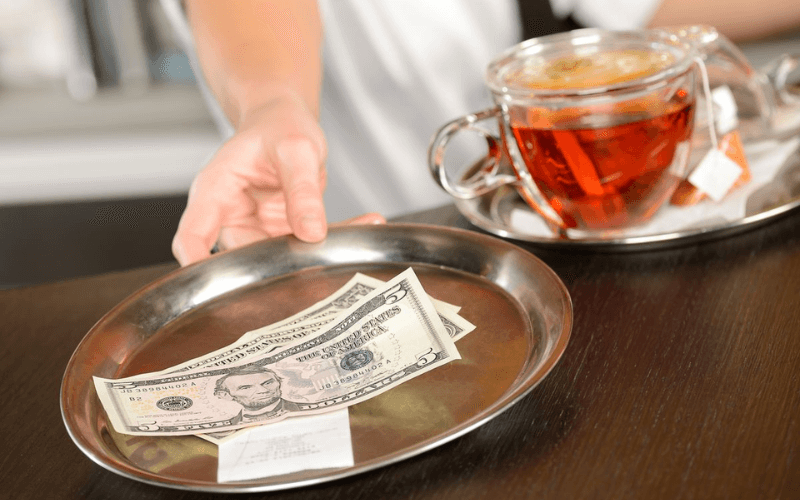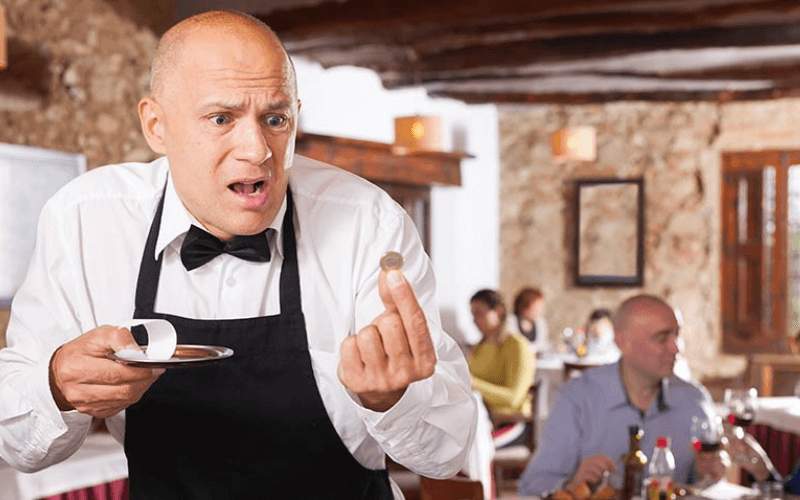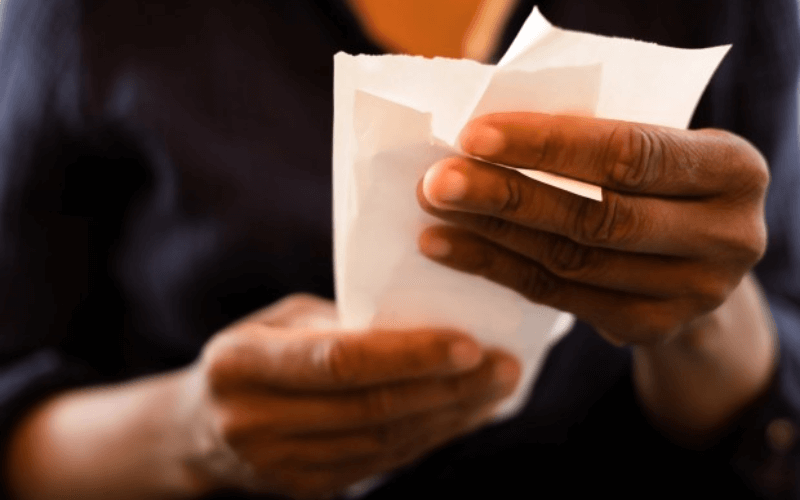Giving a tip to service workers became the standard in the 1900s.
Word on the street is that the tradition migrated from Europe due to the upper
class.
In the United States, tipping is not mandatory in theory. From a
legal standpoint, it is considered voluntary.
However, if you leave a restaurant without offering a gratuity
ranging from 15 to 25 percent, it is highly probable that a waiter will pursue
you, questioning your motives.

Gratuities are frequently a primary means of remuneration for wait
staff and other service providers in the United States. Employers often
compensate these employees with lower wages in expectation that tip earnings
will constitute a significant portion of their income.
In countries where tipping is not customary, tips are simply
included in the price of the meal. Consequently, an advantage of tipping is the
freedom to give whatever amount is appropriate: if the service is
unsatisfactory, a modest tip should be left, indicating to the server that
their performance was below standard.
In order to help you, we’ve gathered 7 tips about tipping in US
that will help you avoid any misunderstanding.
1.Servers and bartenders rely on tips
to get by
Serving tables is the most challenging job. It's like performing
acrobatics on a box of explosives (rushing between tables for hours without
breaks, balancing hot and heavy plates, and memorizing orders like a robot),
all while maintaining a smile on your perspiring face.
It's also emotionally exhausting. People have high expectations
for their food, especially if it doesn't meet their standards.
Certainly, tipping custom in the United States, in cash or
cashless tipping, varies significantly from that of the majority of other
nations.
In numerous European countries, the amount of tip is not that
high. Nonetheless, the customary code of conduct for gratuities in the United
States stands out, owing to the manner in which the country functions.
In the past, tipping was used to show gratitude for excellent
service, however, due to the stagnation of the minimum wage, employees have
grown reliant on it.
2.20% is the real standard for tips
The general agreement states that a tip of 15 to 20% is considered
customary, but honestly any amount less than 20% is seen as inadequate.
The amount of gratuity you leave at a restaurant, whether in cash
or via a tipping platform such as Tipsy, depends on the quality of service you
receive, including the accuracy of your order and whether your server checks on
you after delivering your food.
Even if the service is excellent, it is suggested that you leave a
minimum of 10 percent. For servers at
dine-in restaurants, it is recommended to leave a tip of 15 percent to 20
percent of the bill before taxes. Tips are not expected at fast-food
restaurants.
Most transportation apps, such as Uber, enable you to give a
gratuity to your chauffeur, but ensure you have physical currency available in
case you are using a shuttle, cab, or luxury vehicle. In general, the more
extensive the journey, the greater the gratuity.
Irrespective of whether you are expressing gratitude towards an
adolescent babysitter or a daycare employee, it is commonly recommended to
provide a gratuity of 15 percent to 20 percent for childcare workers.
Hair styling is an authorized, proficient art, and stylists
usually suggest gratuity of approximately 20 percent. Contemplate offering
gratuity of 22 percent to 25 percent for more demanding hairdos, such as
incorporating highlights, lightening, or coloring hair.
Certain massage therapists establish comprehensive rates for their
services, but typically it is recommended to tip 20 percent for spa services
like massages, facials, and other treatments.
Nevertheless, the majority of all-encompassing resorts do not
allow their workers to receive tips.
Related: Benefits of mobile tipping for the hospitality industry
3.You have the right to get what you
want
Food too chilly? Not enjoying your salad? Speak up. Unlike in
Europe, where no one complains, in the US, you are encouraged to share your
opinion!
If you're in an unpleasant situation, inform your server
immediately. Your value as a customer diminishes when you inform them that your
burger was the most terrible thing you've ever tasted while pointing to an
empty plate.
4.Cash is the preferred form of tip
Despite the growing trend of cashless tipping, the majority of
workers prefer to receive cash. It's currency you can bring home after your
work period. If gratuities are paid with a card, you must wait a few days and
they are processed by your supervisor.
However, whether you tip in cash or use a tipping platform, it's
valued. Don't refrain from tipping in US if you lack cash.
Examine the gratuity guidelines at a corporation prior to
utilizing their services. If there is no option to tip an employee during
payment, inquire if they would rather receive a gratuity through a peer-to-peer
payment platform like Tipsy or in physical currency.
Simply ensure that you leave physical currency in a conspicuous
location when you may not be available to personally communicate with the
employee, for instance, in the case of hotel housekeeping.
Many hotel patrons who give gratuities to the cleaning staff leave
tips on a daily basis prior to checking out of the hotel, both as a way to
acknowledge the individual currently attending to the room and with the
anticipation of receiving satisfactory service.
5.You can show your dissatisfaction
with tip
Poor service is uncommon but it occurs. To refrain from tipping
completely, however, the service would have to be extremely unsatisfactory.
Leaving only 10 percent is a definite sign that the experience was
below average. If you genuinely believe that your server does not deserve
payment for their service, the optimal approach is to communicate to the
restaurant manager the reason for not leaving a tip.

If you leave without tipping or offering an explanation, your
server will be curious about the rationale behind it.
Additionally, putting 2 cents near the bill indicates to the
waiter that the tip is intentionally minimal due to bad service.
Even if the server has somehow displeased you to the extent that
you have no desire to leave any gratuity whatsoever, it is still advisable to
leave the 2 cents to ensure they comprehend that your lack of tip was not
accidental.
6.Always verify the bill before
tipping
When the bill arrives, it is important to verify a few things:
Firstly, make sure that it is the correct bill and that the items listed are
the ones you ordered.
Secondly, check to see if the gratuity has already been
automatically added. There may be a mention of an 18% "Service
Charge", so if it is already included, there is no need to leave an
additional tip.
However, if you were with a large group and feel that they deserve
it, feel free to add extra.

Thirdly, when splitting the bill, make sure that any
"recommended tip" section (which provides percentages for 15/18/20%
tips) is based on your portion, not the entire bill.
Sometimes, this calculation is not adjusted and you may end up
tipping double the intended amount. In addition, if you split the bill in half,
only tip the tax once, not twice.
7. There are situations in which you
should never tip
Teachers are not allowed to receive monetary contributions from
individual students or parents.
consult with the educational institution for instructions
regarding a present; such as a voucher for a dining establishment or wellness
center. Additionally, inquire about regulations regarding the monetary worth.
In the state of Massachusetts, for instance, individuals employed
in the public sector are prohibited from receiving gifts exceeding $50 in
value.
Many healthcare professionals are forbidden from receiving cash
and presents. Demonstrate your gratitude verbally, or pen a sincere note to
convey the significance of their care to you.
There is no requirement to provide a gratuity when they deliver
your parcel. There is only one circumstance in which you may consider doing so.
If it is consistently the same individual and you frequently encounter them, it
would be a kind gesture to offer a small gift during the holiday season.
Read More: Tipping in Thailand
Conclusion
Tipping is a highly-debated aspect of the service industry. The
issue is that the adaptability of the system means that one person's
understanding of a generous gratuity is completely different from another's.
Moreover, there will always be individuals who view tipping as
discretionary and simply opt not to engage in it.
The internet is filled with articles where professionals in the
food service sector criticize stingy tippers. Naturally, gratuity is intended
to ensure satisfactory service, with the understanding that if you have a
negative experience, you shouldn't tip.
However, what many people tend to overlook regarding tipping in US
is that service workers receive wages below the minimum and, in numerous cases,
subpar service is beyond their control.
Overall, if you are visiting US, it’s better to tip service
workers, whether in cash or a tipping platform such as Tipsy.